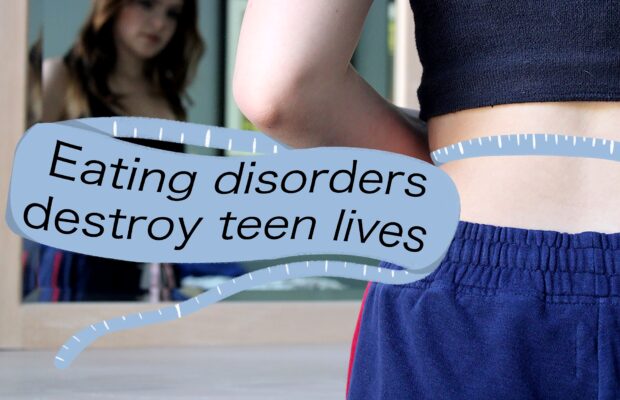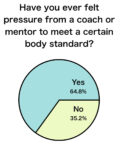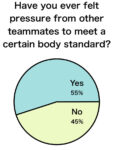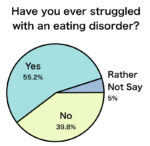Eating disorders destroy teen lives

As modern media has evolved, teenagers across the world have adopted a negative mindset about body image. According to the National Association of Anorexia Nervosa and Associated Disorders (ANAD), an eating disorder will affect at least 28.8 million people in America, totaling to about 9 percent of the population. The stigma around eating disorders has made it difficult for people to feel comfortable speaking out about their struggle in fear of sounding like they want attention instead of needing help.
–Health isn’t numerical–
by Sarena Kabir
For the longest time, I have never felt comfortable in my own body. I convinced myself that this body that I live in is something that only weighs me down, because I can’t be like the other girls who are skinny. Rather I have always seen myself as a fat girl, who is only a disgrace to her family.
Over time, I go through these cycles, from not eating for days, to then eating a lot of food. Eating disorders are almost like a spectrum, and I lie somewhere in between. It isn’t easy to get over it. You can’t just create this meal plan that will automatically solve things, because your brain isn’t wired that way. To overcome the disorder, it takes a lot of time, and it is very easy to relapse back into that old situation.
I would say the ending of my freshman year was when my eating disorder was at its peak. Within just three months, I lost a lot of weight due to my lack of eating. Diving into my sophomore year, in order to maintain that weight I achieved, I would continue my trend of not eating, and then eating more on the weekends.
When I went to the doctor for my annual checkup near the ending of my freshman year, she applauded me for the amount of weight I had lost and that I was not in the “obese” category of her weight chart. Looking back, it felt amazing to have lost that weight numerically. Though, through that process, I felt drained. I ate so little that when I did eat something, it disgusted me. I even shut out so many people in my life because I was never happy with myself, and anything and everything else was just another ick. My doctor had congratulated me for just a numerical change on my life, rather than focusing on my actual wellbeing, only feeding this thought that this value defined how healthy I was. I forgot that I needed to internally feel satisfied with my body, rather than focusing on a numerical value. And that was something no one could understand. My parents pressured me to lose weight because I was told that I was not as skinny and pretty as all the other girls at school. Despite the toll my parents took on me, they never understood how I truly felt, and it was all about numbers and looks to them.
To be honest, I never knew how to cope with my eating disorder. My doctor would always say to control portion sizes to maintain weight, but nothing further. On top of it all, I was afraid to reach out for help because of the worry that I would be hospitalized for several days and have to pay all the additional expenses just to become healthy. It makes it difficult for other people to reach out for help when there have been plenty of stories where people reach out for help, and then end up in the hospital a few days later, or have everything told to their parents.
For all of my life, I bottled up how I felt, I never reached out for help, I never knew how to even cope with my eating disorders. I have had to battle this obstacle all on my own. And that was the toughest part of it all, thinking that I was alone all this time. But that is not the case. There are millions and millions of people who struggle with an eating disorder besides me, and now I know that I am not alone, and neither is anyone who is struggling with an eating disorder.
Standards from Sports
In the sports world, it is a common occurrence that athletes try to fit the stereotypical convention of an athletic body, even if that pushes them towards unhealthy eating patterns. According to the National Eating Disorders Association (NEDA), over a third of female athletes competing in Division 1 of the NCAA reported symptoms of anorexia, with similar patterns being found in male athletes. Many sports, such as wrestling and running, place an implicit or explicit emphasis on diet and weight requirements, perpetuating the harmful idea that one has to adopt extreme eating habits to achieve optimal performance.
Apala Bhunia, senior, struggles with an eating disorder that has affected her relationship with swimming, a sport that requires a lot of endurance. She felt that the competitive environment of the program pressured her to change her body. “The coaches would care more about our times, and whether we were fast enough or not. Being a bigger woman surrounded by, you know, a lot of people who had the typical swimmer body, it was a lot of pressure, and I felt like my body kept me slow, even though it didn’t,” Bhunia said.
According to the NEDA, a risk factor for eating disorders in athletes is the belief that a lower body weight leads to better performance. Kian Alamir, an NPHS graduate and weightlifter, emphasizes that in reality, successful athletes have varying body sizes. “Different positions require different body types,” Alamir said. “I also think that we have to understand that peak performance and being good at the sport really doesn’t have much to do with how you look to be honest… people with all different body types can perform at an extremely high level.”
Eating disorders can be a hard topic to talk about; for a lot of people, it is hard to know when one is struggling, making it more difficult to ask for help when needed. Melanie Masson, girls basketball coach, used to struggle with an eating disorder and felt like they didn’t have someone they could talk to at first. “I didn’t feel comfortable going to someone of the opposite sex, who, you know, didn’t necessarily think the way that I thought,” Masson said.
Professionals believe that it is important for athletes to have an environment that contributes positive attitudes toward body size and shape. Masson agrees with this, stressing the importance of having a support system. “Find someone that you can even just vent out to, whether it’s going to therapy, going to your parents, or going to your friend who you know won’t judge you. But you know, who will also kind of [encourage] you,” Masson said.


Disordered Experience
Eating disorders stem from a variety of factors. Whether teens are scrolling through Instagram, using mobile apps to calorie count or receiving pressure from their peers and family, these images and thoughts of the “ideal body” are significantly damaging to self esteem and mental health.
Forest Penzin, senior, began struggling with an eating disorder at a young age. “Since I was little, my parents were always contradictory about eating habits,” Penzin said. “It was just this ‘you can’t win’ kind of mentality. So I never had a good relationship with food.”
Their freshman year, Penzin’s disorder worsened. “I was just losing a lot of weight really quickly because I started downloading tracking apps and stuff like that…I was like so proud of it for some reason, and that’s what I feel like makes it worse. It became an obsession though, where I would always be watching ‘What I eat in a day’ videos, weight loss videos, stuff like that, where it just kind of became my whole life,” Penzin said.
Social media apps such as Instagram, Snapchat and TikTok can be very consuming to those who struggle within body image. As a creator of content on social media, Penzin has been affected by the negative aspects of it. “It became my whole life when people started paying different attention to me. Strangers would constantly compliment me on my body. Especially with social media, I was like “oh yeah, that’s how I’m supposed to look.” I get more likes when I look skinnier,” Penzin said.
 Calorie counting has also become a common habit for those who struggle with body image as there are many apps available to track the nutrition of every meal. Rosie Fischer*, senior, started using MyNetDiary to count her calorie intake after she was encouraged to do so in school. “I feel like there’s not enough knowledge on nutrition because when I first learned about calories and tracking, I thought that’s what you were supposed to do to be healthy, but that’s not how you stay healthy,” Fischer said.
Calorie counting has also become a common habit for those who struggle with body image as there are many apps available to track the nutrition of every meal. Rosie Fischer*, senior, started using MyNetDiary to count her calorie intake after she was encouraged to do so in school. “I feel like there’s not enough knowledge on nutrition because when I first learned about calories and tracking, I thought that’s what you were supposed to do to be healthy, but that’s not how you stay healthy,” Fischer said.
Social media is also a powerful factor that influences how Fischer perceives her body. “It’s so easy to compare yourself with other people who have the ideal body type and then you look at yourself and you’re like, Why do I not look like that?” Fischer said. “Since it’s just sharing pictures…you don’t really see what led to that picture being taken and what it took to get to that point.”
Penzin stresses the importance of seeking help when struggling from an eating disorder and to not get discouraged despite the challenges. “It’s ok to reach out to someone if you feel like you need help,” Penzin said. “But [healing is] not linear…you’re going to go back and forth.”
*Rosie Fischer is an anonymous source

Seeking Support
As eating disorders become increasingly common, knowing how to properly cope with them and where to go for support is important in the healing process. NPHS strives to make resources readily available for students in need.
Tina Coleman, an NPHS counselor, goes through the treatment plans for people struggling with eating disorders. “It’s a treatment team plan because you’re going to work with the students evolving with the therapist, depending on the severity and how long the parents have been in contact with the medical doctor,” Coleman said. “We get a release of (medical) information so we can communicate because there’s usually a treatment team plan with a nutritionist depending on what type of illness eating disorder it is.”
Coleman gave advice on what people outside of the treatment team could do. “I think for student’s, if their friends are aware of it, understanding what might be the triggers or the concerns and just being supportive, and encouraging the person,” Coleman said.
Additional resources can be found on the CVUSD website, one being the Center for Discovery in Thousand Oaks. The outpatient treatment program provides online service via call for people of all genders and ages. It provides treatment and encourages people who are struggling with eating disorders to open up about them so they can work towards living life without them.
Currently at the Los Angeles location of the Center for Discovery is Primary Therapist, Rachel Lipstone. She helps all kinds of people to work through their eating disorders. “There are a lot of misconceptions about eating disorders, including stereotypes about who struggles with them (e.g. it is a myth that it is only thin, white, upper and middle socioeconomic status women and girls) and why eating disorders develop…many people do not know that they are a coping mechanism and attempt at emotion regulation, not a result of vanity or self-obsession.” Lipstone said.
Lipstone suggests resources such as NEDA (National Eating Disorders Association) and Project HEAL for general information and beginning resources. She is also open to direct emails to her at [email protected]. If you need assistance or are struggling to tell people, Lipstone is an open source and is supportive of anything you have to say. “There is no such thing as ‘not sick enough.’” Lipstone said.
Eating Disorder Hotline: (844) 950 3144 / Suicide Hotline: (800) 442 4673



